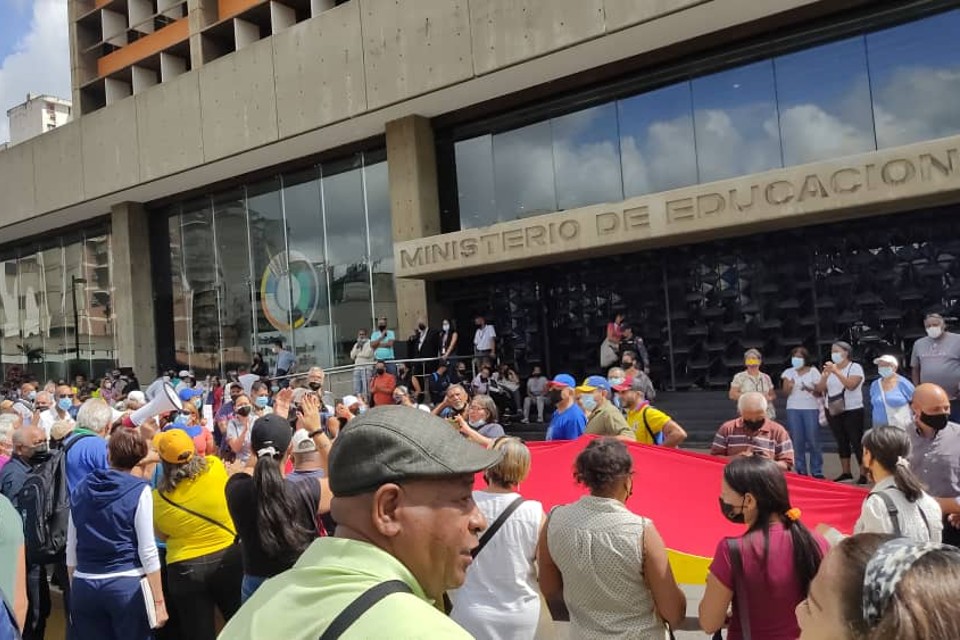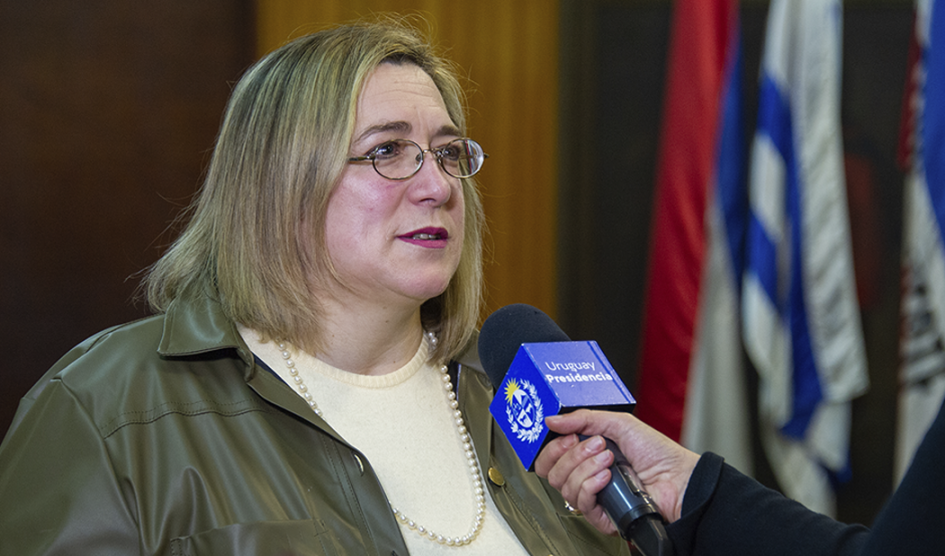Despite the fact that the teachers have protested for days and warned that they would go on a national strike if the vacation bonus is not completely cancelled, the Minister of Education Yelitze Santaella ignored the demonstrations and has already set a date for a return to class without considering improvements in the conditions
The Minister of Education Yelitze Santaella announced that the start of the new school period for the basic and secondary subsystems will be between September 15 and 20, 2022. The announcement was made during a broadcast in which she participated together with President Nicolás Maduro.
With 40 days in advance, Santaella set a date for the resumption of classes, just when the protests of teachers who reject the non-payment of their vacation bonus and the application of the controversial Onapre instruction, which has been denounced, multiply throughout the country. and criticized by workers from the entire public administration, since it has meant a deterioration and a significant reduction in labor benefits achieved.
#InVideo?| Minister for Education, @_LaAvanzadora announced that the classes corresponding to the new school year will be resumed at the national level between #15Sep and the #20Sep #VenezuelaIsPeace pic.twitter.com/WA84Dugh4n
— VTV CHANNEL 8 (@VTVcanal8) August 5, 2022
One day before the announcement -during the national broadcast- a large group of teachers bet and manifested in front of the office of Education in Caracas and They sang it clearly to both President Maduro and Minister Santaella, in parallel to another group of protests that occurred in several cities in the country.
The teachers questioned the return to class if the conditions of the decision regarding the incomplete and fractional payment of the vacation bonus do not change, which was not only paid based on the salary prior to the increase decreed in 2022, but they also deposited the equivalent to just 10 days in the first half of August, 10 more days are expected for September, 10 days in October and 75 days remaining between January and July 2023.
The teachers stated that they received payments that barely exceeded Bs. 100 and the labor personnel have not yet received any payment.
The controversial Onapre
The teachers of Fe y Alegría joined the request of the public workers, who request the elimination of the instructions of the National Budget Office (Onapre)which has become a violation of labor rights established in the collective agreements of male and female workers.
At a press conference held on Friday, August 5, the director of the Fe y Alegría Schools Program, Noelbis Aguilar, called on the Executive Power, especially Minister Santaella, to make a reconsideration regarding the application of this instruction.
The director of Fe y Alegría pointed out that it is a risk for the teaching staff “which is key to the development of the country” that agreements established in the collective contract are not respected, such as the payment of the vacation bonus, which was paid based on the salary of the month of December 2021; that is, without the increase that brought the salary to 130 bolívares.
The president of Fe y Alegría in Venezuela, Charles Lazzari, assured that the Onapre instructions are “illegal” and should not be valid.
Mr. President, Madam Minister (Yelitze Santaella), Mr. Director of Onapre, these people have complied; you comply. This right cannot be waived by mandate of the Constitution itself. Comply so that all teachers continue to comply, not only those of Fe y Alegría, but the rest of the workers linked to education who are affected by this measure, which is illegal.
They assured that the Fe y Alegría schools serve an enrollment of more than 100,000 students at all levels of education in the national territory, so their more than 10,000 teachers also need to be paid their benefits.
The Bricomiles do the work of FEDE
Among a drop of love and now the Bricomiles, the integral maintenance and repair of the schools, ended up being made official as a responsibility of all, except for the National Executive. To date, Minister Santaella has made reference to the work of the Military Community Brigades (Bricomiles), which according to official data have been constituted 23,832 for the repair of schools and high schools.
But little is known about the budget and execution of works of the Foundation for Educational Buildings and Endowments (FEDE), an agency attached to the Ministry of Education and entity to which this work corresponds. According to information published on the FEDE page, “the 23 thousand bricomiles represent 90% of the 26,400 registered educational institutions and 18,618 directors and directors have joined this work.”
Maduro specified that these community brigades are “men and women, parents and representatives, the educational community and volunteers who are doing through this system that Minister Yelitze Santaella gave to all educational establishments.”
Through social networks, FEDE ensures that the materials are delivered to the volunteers, mothers, fathers and representatives in charge of the repairs.
Immediate response to village reports!
Bricomiles of the CEINB La Libertad, San Juan #Caracasreceived from the Bolivarian Government of the Pdte @NicolasMaduro through the MPPE-FEDE, the materials to advance in the rehabilitation of your school#Bricomiles1x10 pic.twitter.com/C7CJvyLFND
— Foundation for Educational Buildings and Endowments (@ContactoFede) August 6, 2022
But it is assumed that the brigades “have the objective of compiling reports on the needs of the country’s educational and health centers, an action that allows, after corresponding evaluations, to carry out repair work on the infrastructures that have been reported through the VenApp application.
Santaella pointed out that there will be more than 20,000 educational institutions that will receive attention through the brigades “from decoration to major problems, equipping from chairs and desks, we are working very hard.”
* Read also: Bricomiles serve to have cheap labor and take political advantage, say experts
The minister made it clear that the objective of the Bricomiles is that during the month that remains to return to the classrooms, the required work is done, which according to teachers and managers and documented in investigations carried out by organizations such as Cecodap, accumulate more than two years of serious and systematic maintenance problems due to the absence in person at the institutions, due to confinement due to the pandemic. “The goal is that when classes restart, children have a new space,” said Santaella.
These major problems will need more than a drop of love and willingness. According to the report Study among ruins, carried out by the organization that defends children’s rights Cecodap, 56 educational centers were consulted, between public and private, in nine states of the country. The situation registered in the schools affected 32,656 students: 51.5% in private education and 48.5% in public education.
The report records that 59% of educational centers reported failures in the electrical service, with power outages that last up to four hours or more.
Of the educational centers consulted, «59% report that they face damage to their infrastructure, which implies broken roofs, leaks, out-of-service bathrooms, paintings in poor condition, fallen bars and walls, broken desks, windows and doors, sewage cans, roofs with holes, among other damage due to structural wear and lack of preventive and corrective maintenance.
Post Views:
88








